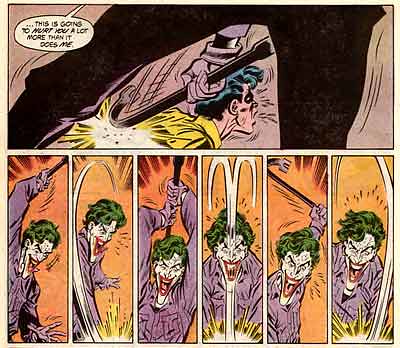Did Batman Kill The Joker At The End Of ‘The Killing Joke’?
YES-I realize this is an old article, but I've never heard this theory before, and my mind is blown. This is Grant Morrison's take on the classic story "The Killing Joke".

Here's the final page:


YES-I realize this is an old article, but I've never heard this theory before, and my mind is blown. This is Grant Morrison's take on the classic story "The Killing Joke".

For Batman fans, The Killing Joke needs no introduction; more than twenty years after being published, Alan Moore’s graphic novel remains one of the all-time iconic clashes between The Joker and the Dark Knight, and perhaps the definitive tale of the Clown Prince of Crime’s tragic origin. With the oft-mimicked but unmatched style found in Moore’s intricate dialogue and Brian Bolland’s vibrant artwork, as well as the story’s in-depth exploration of the divisions that separate the arch-nemeses from one another, it’s easy to see why The Killing Joke maintains a high level esteem even today. In fact, the story has influenced the Batman vs. Joker stories in both Tim Burton’s Batman and Chris Nolan’s The Dark Knight.
But what if readers have been misinterpreting its conclusion since 1988? What if The Killing Joke‘s climactic panels depict Bruce Wayne reaching out and taking the life of his oldest foe, rather than a shared moment of madness between both men? Could Moore’s one-shot comic really be the final Joker yarn, the one where he succeeds in breaking Batman and pushes the world’s greatest detective so far over the edge that he breaks his most sacred rule?
According to comic book writer and author of numerous Batman titles, Grant Morrison, that’s exactly what happens at the end of The Killing Joke. In a recent interview with Kevin Smith about his new Wonder Woman project, Morrison spoke about Moore’s work and offered his own take on what happens as Batman and The Joker laugh maniacally together in the rain, suggesting that the former actually murders the latter. Here are Morrison’s words from the ‘Fatman on Batman’ podcast:
That’s why it’s called ‘The Killing Joke.’ The Joker tells the ‘Killing Joke’ at the end, Batman reaches out and breaks his neck, and that’s why the laughter stops and the light goes out, ’cause that was the last chance at crossing that bridge. And Alan Moore wrote the ultimate Batman/Joker story — he finished it.
Here's the final page:

It’s difficult to look at that polyptych keeping Morrison’s words in mind without seeing exactly what he’s talking about. In panel five, Batman reaches his arm out toward The Joker before the laughter cuts two panels later and the headlights shut off; the pictures almost speak for themselves. In the aftermath of what The Joker has put Batman – not to mention Jim and Barbara Gordon – through over the course of the narrative, one may wonder how The Killing Joke could end any other way. How can Batman possibly justify doing things “by the book,” as Gordon implores him to, this time?
On the other hand, the art alone appears to debunk that reading just based on where Batman places his hand, which comes to rest on The Joker’s shoulder rather than wrap around his throat as Morrison states. Moreover, the script doesn’t indicate anything as far as Batman strangling The Joker goes. (Though in fairness, there’s a lot that can happen off the page between writer and artist.)
Check out the script page below

Some have pointed out that the best evidence against Morrison’s point is Barbara Gordon. During The Killing Joke‘s events, The Joker shoots her through the spine, paralyzing her below the waist – and setting the foundation for her transformation into the Oracle. The fact that the Oracle repeatedly shows up in subsequent Batman features and that The Joker continues to be a thorn in Batman’s side solidifies The Killing Joke‘s events as canon. Then again, Alan Moore himself has indicated that he never intended for the book to be in continuity – that was DC’s idea.

